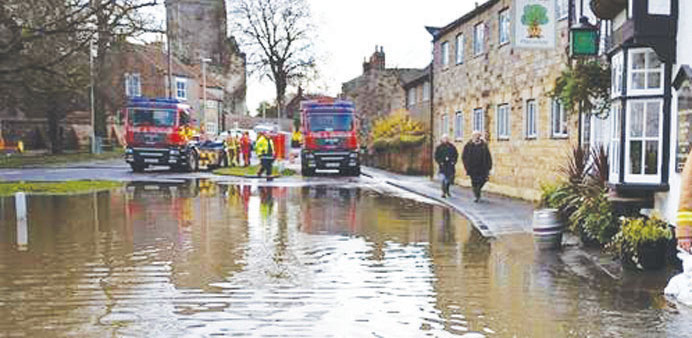|
Hundreds of thousands of flood-hit homeowners will still be able to buy insurance after a deal was reached between the government and the insurance industry. |
The agreement will cap flood insurance premiums, linking them to council tax bands so people will know the maximum they will have to pay. It is expected to protect up to 500,000 households.
Under the terms of the scheme, known as Flood Re, all UK household insurers will have to pay into a fund that can be used to pay claims for people in high-risk homes.
The agreement, which will form part of the water bill, follows months of talks over the future of insurance for properties at risk of flooding.
A statement of principles, which obliged insurers to continue providing cover to existing customers but had no provisions for cost, was due to expire at the end of July.
That will now continue until the new system comes into force.
Otto Thoresen, director general of the Association of British Insurers, said his members’ priorities had always been to make sure flood insurance remains affordable and available for everyone who needs it.
“Getting to this stage has required compromise by both sides, and there remain issues that need to be overcome,” he said. “Insurers and the government are now working towards a shared vision, with Flood Re as the government’s preferred choice.”
Owen Paterson, the environment secretary, said there were still areas that need to be worked through. “Flooding is terrible for anyone affected by it, and can lead to worries the next time there is heavy rainfall. We have worked extremely hard with the industry to reach an agreement on the future of flood insurance.
“People no longer need to live in fear of being uninsurable, and those at most risk can get protection now and in the future.”
Paul Cobbing, chief executive of the National Flood Forum, said there were still questions about the scheme. “What we don’t have are answers to the impact on households, and how affordable and accessible this scheme will be for people, and whether it protects those who are vulnerable.
“However, this is the preferred approach because it actually does what insurance is supposed to do, which is providing cover for everybody and sharing risk between them, whereas other models didn’t do this.”
The NFF charity said the number of calls to its helpline trebled in the past year, with some callers reporting huge rises in the cost of their cover, and others saying they were unable to sell their properties. Some householders’ premiums had doubled to £2,000 a year, and in one case a small business saw its premium rise from £4,000 to £25,000 a year.

